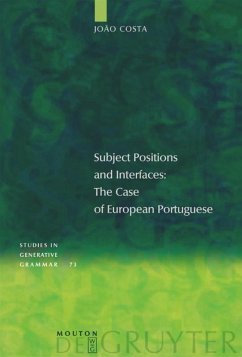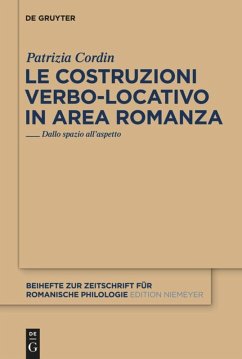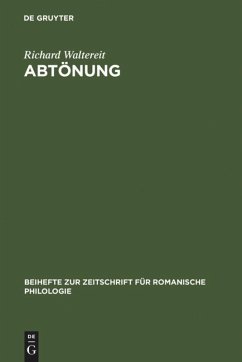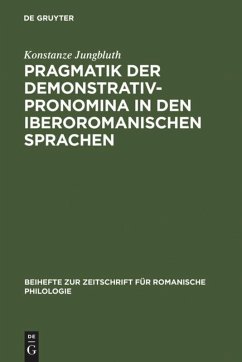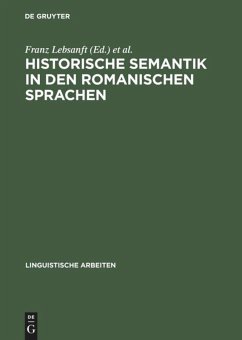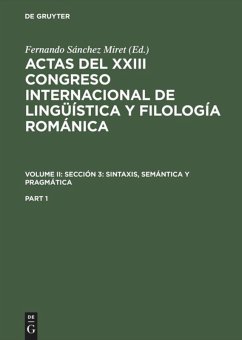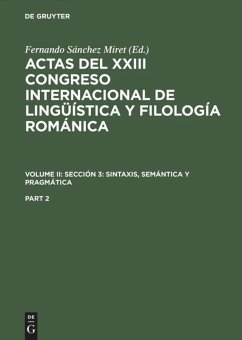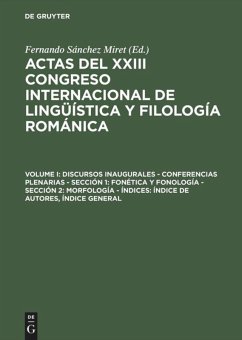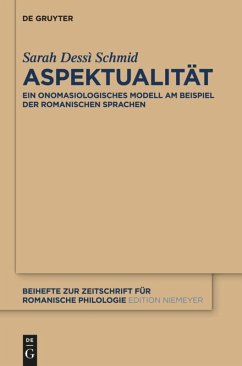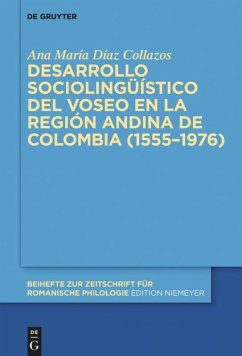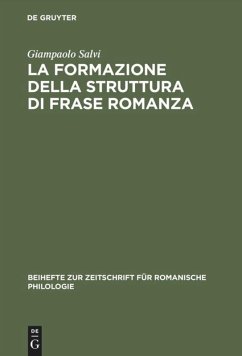
La formazione della struttura di frase romanza
Ordine delle parole e clitici dal latino alle lingue romanze antiche

PAYBACK Punkte
0 °P sammeln!
The volume studies the mechanisms of diachronic change in sentence structure between classical Latin and early Romance languages. For this purpose it draws on the theoretical insights of Generative Grammar. Special reference is made to two of the aspects in which this change reveals itself most clearly: the order of the major constituents in the sentence and the syntax of weak and clitic pronominal forms. These two syntactic phenomena are then used as fundamental criteria for the reconstruction of sentence structure in the various stages of linguistic evolution.
Il volume studia i meccanismi del cambiamento diacronico della struttura di frase fra latino classico e lingue romanze antiche utilizzando il quadro teorico della Grammatica Generativa.
Dopo una descrizione dettagliata dei fenomeni dell'ordine delle parole in latino, viene formulata un'ipotesi sulla struttura di frase di questa lingua. Per le lingue romanze antiche vengono individuate due grammatiche in concorrenza, una innovativa a Verbo Secondo e una con caratteristiche più simili a quelle del latino, e viene formulata un'ipotesi sul meccanismo diacronico che ha portato dalla struttura di frase latina a quella innovativa romanza, ipotesi che vede nelle strutture latine a verbo iniziale il punto di partenza dell'evoluzione. Vengono poi ricostruiti i cambiamenti intervenuti nel sistema di collocazione delle forme deboli dei pronomi nel passaggio dal sistema latino al sistema romanzo arcaico. Infine si affronta il problema del cambiamento di categoria delle forme pronominali deboli del latino che diventano i clitici delle lingue romanze antiche, cambiamento scatenato dalla progressiva perdita del sistema morfologico dei casi e favorito dalla contiguità fra posizione delle forme deboli e posizione del verbo nel latino tardo; la successiva evoluzione dei clitici romanzi permette di operare distinzioni più sottili relativamente alle varie tappe del processo di grammaticalizzazione che porta dalle parole deboli del latino agli affissi che troviamo in alcune lingue romanze.
Dopo una descrizione dettagliata dei fenomeni dell'ordine delle parole in latino, viene formulata un'ipotesi sulla struttura di frase di questa lingua. Per le lingue romanze antiche vengono individuate due grammatiche in concorrenza, una innovativa a Verbo Secondo e una con caratteristiche più simili a quelle del latino, e viene formulata un'ipotesi sul meccanismo diacronico che ha portato dalla struttura di frase latina a quella innovativa romanza, ipotesi che vede nelle strutture latine a verbo iniziale il punto di partenza dell'evoluzione. Vengono poi ricostruiti i cambiamenti intervenuti nel sistema di collocazione delle forme deboli dei pronomi nel passaggio dal sistema latino al sistema romanzo arcaico. Infine si affronta il problema del cambiamento di categoria delle forme pronominali deboli del latino che diventano i clitici delle lingue romanze antiche, cambiamento scatenato dalla progressiva perdita del sistema morfologico dei casi e favorito dalla contiguità fra posizione delle forme deboli e posizione del verbo nel latino tardo; la successiva evoluzione dei clitici romanzi permette di operare distinzioni più sottili relativamente alle varie tappe del processo di grammaticalizzazione che porta dalle parole deboli del latino agli affissi che troviamo in alcune lingue romanze.




